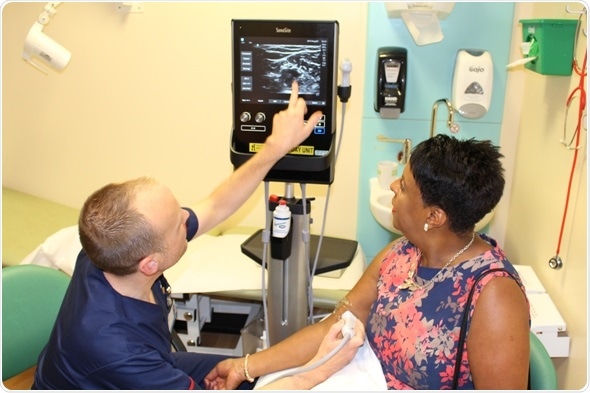Point-of-care (POC) ultrasound is helping to improve the quality of life for metastatic breast cancer patients in the West Midlands thanks to the fundraising efforts of Breast Friends Solihull and the University Hospitals Birmingham Charity. A FUJIFILM SonoSite SII ultrasound system funded through donations is enabling chemotherapy patients to be fitted with portacaths instead of traditional peripherally inserted central catheters (PICC lines).

The SII system is enabling chemotherapy patients to be fitted with portacaths instead of traditional PICC lines
Mike Hammond, CEO of University Hospitals Birmingham Charity, explained:
PICC lines provide an effective route for the delivery of chemotherapy drugs, but can be quite restrictive on a patient’s lifestyle; they require weekly appointments to flush the lines and they prevent patients from swimming, for example. We wanted to offer our patients a better solution – subcutaneous portacath lines – that eliminate these issues. Ultrasound guidance is essential for placing and accessing these semi-permanent catheters but, unfortunately, there was no funding within the trust to purchase a POC ultrasound system for oncology outpatients. University Hospitals Birmingham Charity decided to fund this and, as a well-established trusted supplier to the trust, we turned to FUJIFILM SonoSite to provide this system.
Matt Fowler, an Advanced Clinical Practitioner in the Oncology Department, added:
Because the portacath is sutured under the skin, it doesn’t require a dressing, and only needs flushing once a month. This means that patients can swim, go on holiday and have a generally improved quality of life, without having to worry about having a weekly line flush. Many patients say it helps to improve their body image as well, which can be important in helping them through their treatment.
Mike continued:
We’ve only recently obtained the SII system, but it’s working really well for staff and patients alike. Patients are delighted, because they appreciate the advantages portacaths offer over PICC lines, and our clinical staff find it easy to use. It is also a genuinely portable solution that can be used in any room in the clinic, which is ideal.